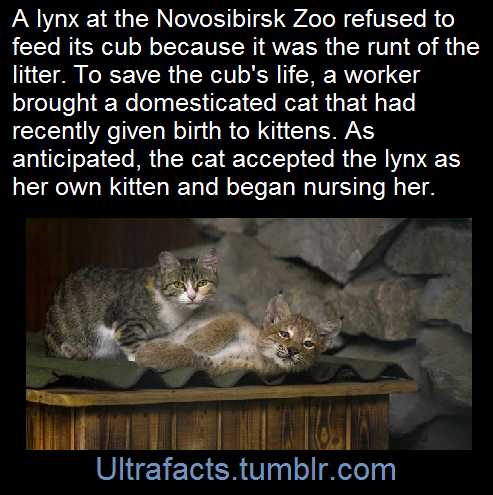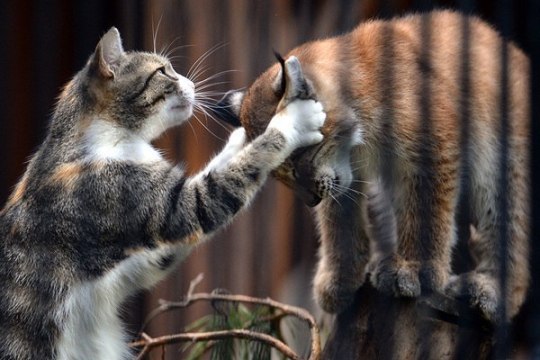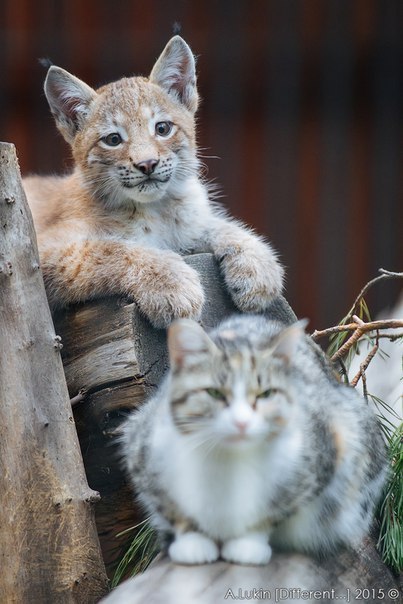queerarmsandlegs-blog
423 posts
big ole gay, white, swedish, gay, vegan, TCK, gay art historian. she/her
Don't wanna be here? Send us removal request.
Photo

Frozen Inuit princesses redesigns. <3 I think it would have been really awesome if they did something like this instead. Either way, it was really fun to gather reference and draw some snowy cuties.
74K notes
·
View notes
Text
when i was a kid the standard of veganism was zero animal products and products tested on animals etc and if you didn’t do that the term didn’t apply but it seems that it’s now used as a goal rather than an absolute? which i 100% agree with but i still feel weird calling myself vegan when i can’t meet the former definition for health reasons (mostly my 300 skin conditions that severely limit what i can put on my face which means i cant choose products based on them being vegan/cruelty free etc)
329 notes
·
View notes
Photo




Rihanna and Lupita Nyong'o will costar in a buddy movie directed by Ava DuVernay for Netflix
“After dramatic negotiation session at the Cannes Film Festival, Netflix has nabbed a film project pairing Grammy winner Rihanna with Oscar winner Lupita Nyong’o, in a concept that began as a Twitter sensation. Ava DuVernay (Selma) will direct, and Issa Rae (Insecure) is in talks to write the screenplay…”
Keep reading at ew

[Follow SuperheroesInColor faceb / instag / twitter / tumblr / pinterest]
143K notes
·
View notes
Quote
“Intersectionality is not primarily about identity, it’s about how structures make certain identities the consequence of and the vehicle for vulnerability. So if you want to know how many intersections marry, you gotta look at the context: what’s happening ? What kind of discrimination is going on ? What are the policies ? What are the institutional structures that play in a role in contributing to the exclusion of some people and not others ?
Kimberle Crenshaw (via ahistoryofanxietyandanxietyand)
5K notes
·
View notes
Text
CALL TO ACTION; @ NONBLACK ALLIES
Read this, digest it, share it in your circles. Share it in all your leftie meme groups, share it with your white friends who need a reason to shrug off some white guilt, & your nonblack friends who think they’re close enough to blackness to use our culture.
I’ve mentioned wanting to start a collective in my city and doing some action in marginalized communities, but instead of doing that i’ve decided to start bigger. Me & other activists have banded together to start a reparations initiative after one we all benefited from was shut down.
Reparations and the importance of reparations are a hot topic in just about every political circle there is. Regardless of ideology it’s often difficult to get people to understand just how important reparations are, not only to the Black community, but to our current racial climate and the social repair that is absolutely necessary for change to happen. A change which is integral to stopping white supremacy + capitalism.
Black activists and leftists have been telling the world for years that the black community is owed reparations in the form of money as well as opportunities like job programs, higher education, and better neighborhoods. This sub-project’s goal is to eventually branch out into an initiative that’ll guarantee all that for the communities that absolutely need it most. The black + houseless, the black + uninsured, the black + otherwise hopeless.
For this subproject to be successful we need people like you to bring attention to it. No one cares about social change unless it’s got a hashtag or pink pussy hat attached to it, so it’s important that people like you get your friends talking about it! Bringing up the concept of reparations can be difficult, but the labor is paramount over all, and any true ally knows the importance of laboring for marginalized communities.
>>>>> Rightful Reparations For Black People <<<<<<< So tell your friends about this group & to join alongside you, about this project, and about how important reparations are.
If you’d like to do your part but can’t commit to something long term and monthly, you can contribute to our paypal pool here: Paypal
7K notes
·
View notes
Photo
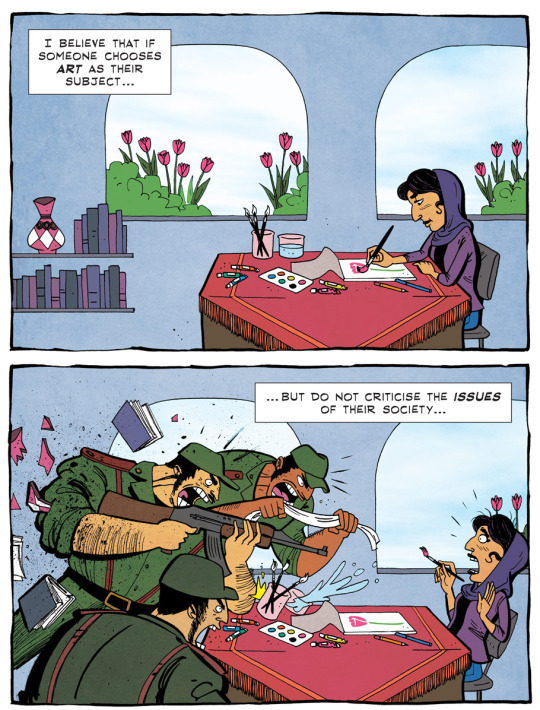


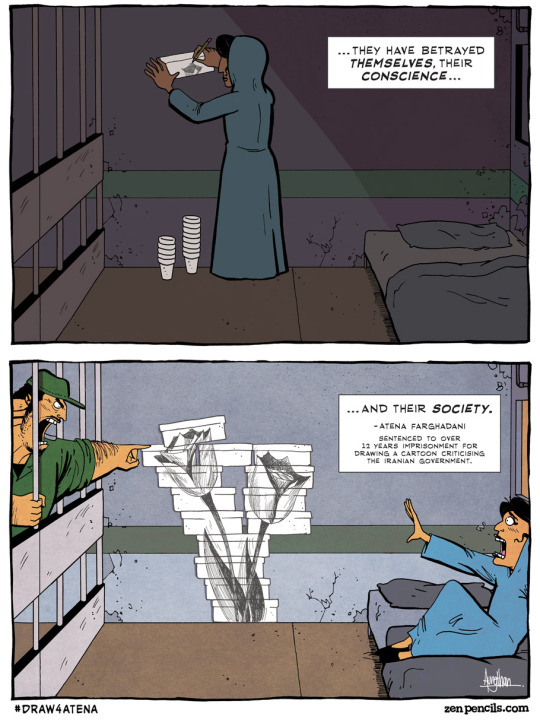

Atena Farghadani is a 28-year-old Iranian artist. She was recently sentenced to 12 years and 9 months in prison for drawing a cartoon.
This cartoon, that she posted on her Facebook page last year, depicts members of the Iranian parliament as animals. It was drawn in protest of new legislature in Iran that will restrict access to contraception and criminalise voluntary sterilisation. Atena’s charges include ‘spreading propaganda against the system’ and ‘insulting members of parliament through paintings’.
Last August, 12 members of the elite Revolutionary Guard came to Atena’s house, blindfolded her and took her to the infamous Evin Prison in Tehran. According to Amnesty International:
“While in prison last year, Atena flattened paper cups to use them as a surface to paint on. When the prison guards realised what she had been doing, they confiscated her paintings and stopped giving her paper cups. When Atena found some cups in the bathroom, she smuggled them into her cell. Soon after, she was beaten by prison guards, when she refused to strip naked for a full body search. Atena says that they knew about her taking the cups because they had installed cameras in the toilet and bathroom facilities – cameras detainees had been told were not operating.”
She was released in November and gave media interviews and posted a video on YouTube detailing her beatings, constant interrogations and humiliating body searches. She was then rearrested possibly in retaliation for speaking out and has been imprisoned ever since. In January, Atena went on a hunger strike to protest the horrible prison conditions. Her health suffered dramatically, and after losing consciousness and suffering a heart attack in February, she was forced to eat again.
The quote used in the comic is taken from the speech Atena gave at her trial. It has been translated into English by the Free Atena Facebook page. You can read the whole thing here.
Time is now against her, she has just two weeks to lodge an appeal. Michael Cavna, comic journalist for The Washington Post, has launched a campaign appealing to artists to help bring awareness to Atena’s case by creating their own artwork in support of Atena and using the hashtag#Draw4Atena. Can a bunch of artists and a hashtag really make a difference and put pressure on the Iranian Government to release Atena? Probably not. But just remember that Atena is currently in prison enduring horrible conditions, and if her appeal isn’t successful, she will be there for another twelve years. FOR DRAWING A CARTOON AND POSTING IT ON FACEBOOK. Don’t we owe it to her to at least try?
Alot worse actually happens out there.. once Being a soldier (which turned me into an activist) showed me..
Signal boost.
119K notes
·
View notes
Link
“For a long time the presence of Afro-descendants in Belgium has been ignored or viewed as temporary, because of the late arrival of migrants from sub-Saharan Africa and the predominance of the student profile up to the 1980s.
This study has been carried out by a consortium of universities (ULg, UCL, VUB). This research is completely novel not only in Belgium, but also at the European level, where Afro-descendants in general, and groups originating from countries formerly colonised by European countries, face many forms of discrimination. This amounts to everyday racism and also has an institutional component encompassing employment, housing and education.
This study shows that Afro-descendants are becoming permanently established in Belgium, as expressed by more marked inclusion of the generation born and socialised in Belgium. Of the Afro-descendants interviewed, 56% have Belgian nationality.
One of the most important results of this study is that it confirms and generalises some prior data (Schoonvaere, op.cit.) concerning the very high educational level of Afro-descendants in comparison with all the other groups, whether they have come from immigration or not. More than 60% of Afro-descendants have a higher education degree and 56% of Afro-descendants have a downgraded status (their qualifications are higher than their employment requires). The rate of unemployment among Afro-descendants is four times higher than that among Belgians and three times higher for the second generation born and educated in Belgium.
Almost 80% of the respondents indicate that they have experienced discrimination, unequal treatment or insults for at least one of two reasons: their skin colour or origin. Almost 80% of the respondents think that they do not have the same opportunities as people who have not come from immigration to get a job or rent a home.
91% of Afro-descendants who we interviewed, consider that colonial history should be taught at school. Of the total, 74% of them think that the colonial question is not mentioned enough or is hidden from public debate. There is no difference between the Belgo-Congolese, the Belgo-Rwandans and Belgo-Burundians and the remainder of Afro-descendants in terms of their demands for commemorative measures.
It also shows that Afro-descendants are more interested in Belgian politics than the Belgian population in general. The strong interest in politics within these groups is particularly related to their higher level of education in comparison with the Belgian population as a whole.
Finally, there is a strong transnationalisation of social practices and contacts with their country of origin are regular and frequent but these are declining over the generations. While those in the first generation mention their country of origin as the sole destination, those in the second generation are looking towards other destinations which they perceive as being associated with better economic opportunities, a better quality of life and, to a lesser extent, with greater openness to people of African descent.
In the end this study shows that the coincidence of factors, namely the structural marginalisation of this group and failure by public authorities to recognise it, are contributing towards creating a feeling of exclusion. The study concludes that there is an urgent need to take the human and socio-economic potential of this population into account and listen to its demands for recognition, in order to build a society that is inclusive towards Afro-descendants.”
I strongly recommend French-speakers to have a look at the study. Unfortunately I could not find it in English.
224 notes
·
View notes
Text
my favourite artstyle is lesbians in old italy
258K notes
·
View notes
Text
How to deal with kids (without hitting them)
1. The Best Defense is a Good Offense: Be proactive with children’s behavior.
Don’t wait until a child is in the middle of a meltdown in the toiletries aisle of Target. Try to be aware of how different situations and stimuli might affect kids of different ages. A few tips:
Kids, especially toddler age kids, struggle with transitions. Give them a clear time table and stick to it. Give them updates as deadlines approach. “We are leaving the library in 5 minutes.” “We need to go see Grandma in 10 minutes.” “Target will only take 20 minutes.”
Getting toted around by adults can be exhausting and frustrating. Give kids tasks to do. Put them in charge of something. It can be something actually helpful (you get to hold the calculator and keep track of how much money we are spending in the store) or something fun to keep their mind busy (count all the blue things in this aisle.) Talk to your kids. Help them feel involved, instead of just a tote bag.
Model self care and emotional awareness. Kids are often dealing with SUPER new emotions, and may not know how to recognize them, contextualize them, or act on them. Talk through your own emotions, or emotions you think they may be having, and show them how to deal with them. “Yeah, I know, mommy is really sad that we can’t go to the park because of the rain. It makes me feel really bad inside. I think if we color with crayons for a while, I’ll feel better.”
Give kids choices. Obviously, age plays a big part here, but a reasonable, curated set of appropriate choices gives kids a growing feeling of agency and teaches making good choices. “Would you like peas or green beans?” “Penguin Shirt or Turtle Shirt?” “Water or apple juice?” This requires YOU to also speak with and listen to the kids. Always important.
Be aware of how the children in YOUR care react to things, and find ways to mitigate “bad” behavior before it happens.
2. “Punishment” is not the goal. Discipline means teaching.
Your goal, as a parent, as a teacher, as a baby sitter, is not to punish kids. Your goal is to help teach kids how to become thoughtful, responsible, and kind people. The entire idea of kids “deserving” bad things because they’ve “been bad” is flawed. If a kid does something “bad”, then we should aim to help them not make that bad choice again.
How?
Identify any immediate stimuli or situation causing the bad behavior and remove/alter it so the behavior stops. This might mean leaving an errand unfinished, a time out, taking away a toy, etc, in order to STOP the behavior that is happening RIGHT NOW.
Talk to the child about why their behavior was “bad.” What bad affects could it have? How does it affect others? What caused it? Kids, even very young kids, can understand complicated things if explained in terms on their level.
Come up with a plan for what to do next time the original stimuli or situation happens. If Timmy tries to take your truck again, what can we do differently? The next time we are in line at the bank, what can we do to make it more fun?
If the child is older, and the offense is more severe, you may feel the need for a tangible consequence. Remember that these should be age appropriate, reasonable, and negotiable. Give kids the ability to reduce their consequence with good behavior, and be willing to modify the consequence if they have a compelling and reasonable request. Listening to kids and being empathetic is not a weakness. It is a sign of respect.
3. Don’t forget that kids are people. Kids are also kids.
Kids will not be perfect angels. You will not be a perfect adult. Sometimes they will be cranky, angry, tired, hungry, selfish, or mean. You can be these things to. One bad day doesn’t mean you are a failure, and it doesn’t mean the kids are a failure. You have to let kids have bad days sometimes. You have to love them anyway and be willing to give it a fresh go tomorrow.
Working with kids is not easy. No one said it would be. But part of working with kids is the obligation to always be thoughtful about our interactions with them- we teach them with everything we do. So we should treat them with all the respect, kindness, thoughtfulness, and patience we want them to learn.
34K notes
·
View notes
Note
I'm a feminist and I'd also like to be a good trans ally. Why are there so many trans people who characterize playing with dolls/wearing dresses/liking pink as a sign they were a girl, and why do some say that their interest in sports was a sign they were a boy? It may not be a community-wide issue, so forgive me that. It strikes me as essentialist and somewhat tactless. Is it okay for me to question people who say things like that? Thank you for your insight!
This is actually a form of institutional violence that trans people, largely trans women, face.
To copy-paste from a previous post I made on this matter:
Growing up, I had a few trans lady friends who were hyped about being openly/visibly butch and/or gnc trans women when they began transitioning.
Three of the bunch committed suicide after basically being blacklisted out of access to medical transition. Others were wealthy enough to be able to move to where they could have a second or third shot. A femme trans lady friend forgot to apply nail polish and makeup to one of her sessions with her doctor, and that led to him keeping her from medical resources for the next two years of care, and she, as well, ended up killing herself. I could keep listing story after story with similar narratives and endings, it’s really pretty common.
Gatekeeping, whether it’s within a medical context, or a social one, relies on heavily policing trans women to prescribe to normative gender expressions dialed up to 11. We don’t, and we tend to suffer. And I don’t think it’s at all fair to cast blame on trans women who follow those norms, not when our survival is paramount and we’re coerced into those conditions via potentially fatal consequences.
Like, I’m a sloppy/lazy femme in terms of my expression, often shifting towards the hoodie and jeans aesthetic because it’s just comfy, but every doctor’s appointment, every tribunal over my transition, best believe I was probably among the most stereotypically feminine presenting ladies those docs saw that day. Not a chance I’d risk it. Every job interview, every meeting when I was looking for housing, same deal. Survival wins over the microscopic impact I might have on the reproduction of gender norms in those instances, especially when my continued survival means I can live to fight those (and other) battles in other ways less tied to my survival.
So, to be blunt and concise, it’s not trans folks upholding harmful notions of gender. It’s cis folks…cis men and cis women, weaponizing society against us to uphold gender norms through us because we’re deemed as threats and as less legitimate, so our standards are often exponentially higher than our cis counterparts.
Like, I live in liberal Canada, and this gatekeeping shit still happens. I have sat down and taught so many trans people how to strategize and what language to use, what narratives will provide the path of least resistance, so that we can get what we need in the aggressively oppressive system we live in.
Like, as a young child, I played hockey, I liked micro-machines, I liked video games, I liked climbing trees, riding bikes, building forts, and track & field.
I told my therapist that in my third session when she asked about my childhood, just minutes after telling me she felt I was ready for hormones. I had to endure 23 more sessions with her, spread across the next year and a half, to get back to where I was mid-way through that third session, a long enough time for her to forget enough about those remarks on my childhood, before I could get access to hormones. When she asked about my childhood again in the 22nd or 23rd session, I told her I played with dolls, and that secretly, my favourite colour was pink as a child, and that I yearned to play house but no one would play with me, that I’d try on my mom’s shoes and some of her clothes, etc. etc. And after I tossed out enough cliche elements of the standard narrative (basically painting myself as a very heterosexual hyper-feminine 50′s housewife), I got access. I can’t say that if I ever got interviewed on public media that I’d stray from that safe narrative, because chances are, my doctors would/could see, and I could lose access to healthcare, employment, housing, etc.
Like I said, I’ve had friends who forgot to wear nail polish and were punished for it. I had a friend…in the dead of winter…who wore pants to an appointment and was suddenly told by the doctor that he had no confidence that she was a ‘real’ trans woman. A trans dude friend of mine got in a car wreck and had busted up ribs, and couldn’t wear his binder comfortably for a while, and his doctor refused to renew his prescription to T. He eventually had to find a new doctor, endure the waiting list, and get back on, which took like, 9 months.
So if we’re saying things like that, it’s almost always a self-defense mechanism. It’s very hard to tell who we can trust, and who has the power to derail our transitions, or kill our support networks, etc. And while I’m sure if all trans people revolted and told the truth, it might help disrupt that system of norms and standards and gatekeeping, but I could never ask others like me to take a stand on principle that would likely kill a great many of them. I know that without HRT, I wouldn’t survive more than maybe three months, it’s really that simple, and I know so many others in the same boat. It’d be like walking into a building burning from a three-alarm fire to try and activate the inactive sprinkler system, instead of calling the fire department to put it out. This isn’t our responsibility.
I think it’s important to remember that trans people who are coerced into expressing these narratives are a tiny demographic, so our ability to significantly ‘reproduce’ or ‘essentialize’ any gender norms is negligible at best. And that in the overwhelming majority of the world, trans folks have to comply with exaggerated gender norms for our gender simply for survival. And that survival must take precedence over worries of us reproducing harm that we’d only be reproducing because cis people can’t get their heads out of their asses over their need to police everything about our bodies and our lives.
Like, in case you’re not aware, the “born in the wrong body” language stemmed from trans patients decades and decades ago, who were being experimented on, sterilized, mutilated, and tortured. Eventually doctors listened to us and our pleas to just treat our dysphoria, but our language didn’t fit necessarily with their worldview. They couldn’t accept that pre-transition trans men and trans women were actually men/women. That we had men’s/women’s bodies. That we were male/female. So we were coerced into using their language for us, in order to get the treatment we needed, to get any shred of support we could get. The cis-dominated structures of science and medicine are to blame for that sexism, cissexism, essentialism, etc. as well.
We’re just trying to get the help we need in a world that does not want us to get that help, and will generally only provide it if we tell them everything they want to hear. Some of the greener, fresh out of the closet trans folks push that sort of language/narrative hard, because it’s what they’re exposed to, it’s what they’re taught keeps them safe, and it’s pretty wrong to be critical of someone for surviving and actively reducing harm against themselves from society at large.
So if you get the urge to criticize a trans person for bringing that sort of thing up, maybe instead criticize the structures that prevent us from saying anything else.
35K notes
·
View notes
Text
Just an experiment. Reblog if you actually give a fuck about male victims of domestic violence and rape.
2M notes
·
View notes
Text
Every single white lesbian who has spent years complaining about the lack of lesbians on screen had better support The CW’s Black Lightning.
Anissa Pierce (portrayed by Nafessa Williams):
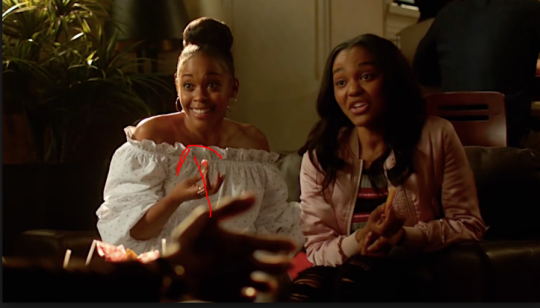
is a canon lesbian with superpowers (who goes by the name Thunder) who has, among other abilities, the power to make herself invulnerable (this means she’s essentially unkillable-although she can be hurt/injured!)
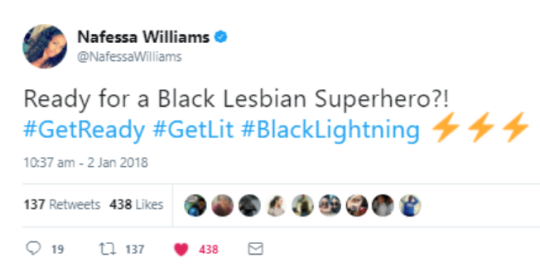
Her comic-canon girlfriend Grace Choi (Chantal Thuy) has already been cast:
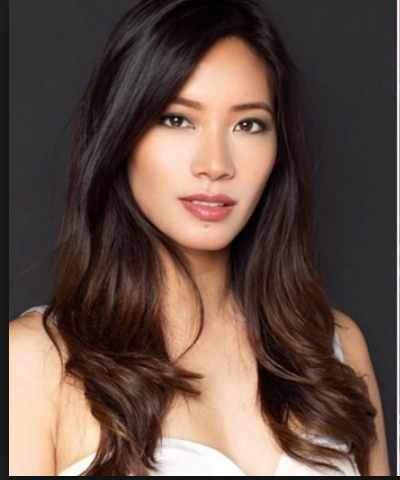
Grace is half-Amazon, and has superhuman durability and rapid healing abilities-which also help to make her relatively invincible!
Also, they’re really cute in the comics:
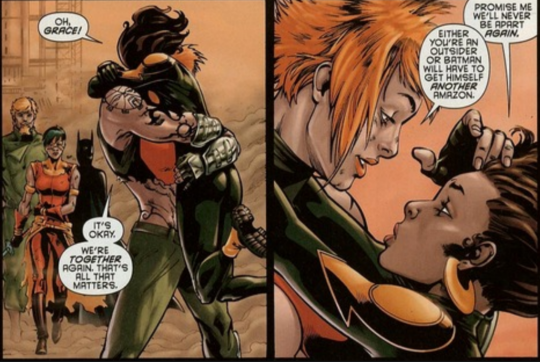

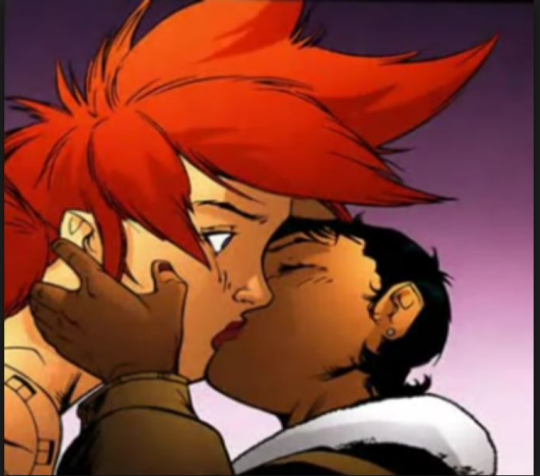
So basically-support this lesbian, interracial, basically invulnerable couple on the CW’s Black Lightning-airing January 16th, 2017!!!!!
123K notes
·
View notes
Photo

“The 44-year-old said she began “Me Too” as a grassroots movement to aid sexual assault survivors in underprivileged communities “where rape crisis centers and sexual assault workers weren’t going.”
“It wasn’t built to be a viral campaign or a hashtag that is here today and forgotten tomorrow,” Burke told Ebony in a statement on Monday. “It was a catchphrase to be used from survivor to survivor to let folks know that they were not alone and that a movement for radical healing was happening and possible.”
http://www.ebony.com/news-views/black-woman-me-too-movement-tarana-burke-alyssa-milano#ixzz4vjecKZuJ
812 notes
·
View notes
Text
Shout to all of my bi ladies in same-gender relationships. I know how hard it is having to deal with biphobia, homophobia, and society’s complete disrespect of f/f relationships simultaneously but you are wonderful, your struggles are valid, and I am sure your girlfriends/partners/wives are incredibly lucky to have you in their life ❤
8K notes
·
View notes
